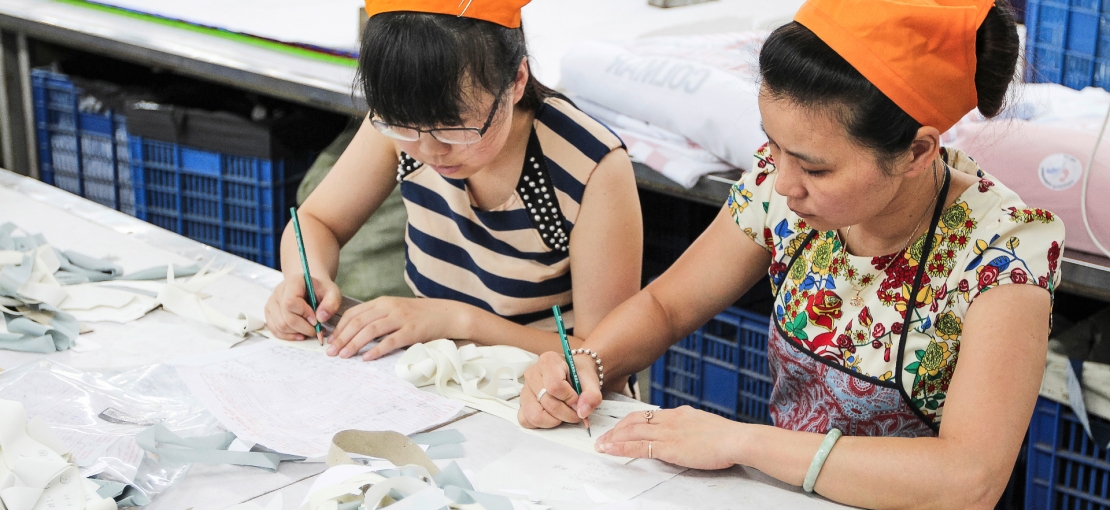
Working together for fair working hours
Did you know that in some production countries, the labor laws regarding working hours are stricter than in Germany? In Germany, up to 48 hours plus twelve hours of overtime are allowed per week. But in China, workers are only allowed to work 40 hours a week with up to 36 hours of overtime a month. We have found numerous instances that deviate from local labor laws in our audits. You can read about what we're doing about it here:
All of our producers are obligated to ensure fair working hours at their production sites. The obligation is as follows:
Hours of work shall comply with applicable laws and industry standards. In any event, workers shall not on a regular basis be required to work in excess of 48 hours per week and shall be provided with at least one day off for every seven-day period. In addition, all workers must have at least one day off per week. Overtime must be voluntary and not a part of the regular schedule. Overtime may not exceed legal stipulations and may not exceed 12 hours per week under any conditions. In addition, overtime must be paid at a higher rate.
Monitoring by independent auditors
An obligation in and of itself is not enough, of course. Therefore, all of our producers are regularly and independently audited by organizations such as the Fair Wear. Auditors check carefully whether there are violations of the provisions on the subject of working hours. This is verified through interviews inside and outside the production site as well as by reviewing documents.
- Are laws regarding overtime respected?
- Is overtime paid correctly?
- Is overtime voluntary?
- Do workers have at least one day off per week?
Result of the Fair Wear Foundation (FWF) audit
FWF audits show that overtime is paid for correctly. Nevertheless, there is too much overtime according to the legal provisions.
Measures we are taking to reduce overtime
Our planning process
There are two seasons per year in the outdoor industry during which production sites manufacture and deliver their goods. This results in very intense conditions during these periods for our producers. We support our producers and reduce peak periods by ensuring that our planning processes are sound.
In 2016 we improved our planning process, which, according to the FWF during the Brand Performance Check, was already good. This means:
- Our planning team is involved at an early stage, gives our producers volume forecasts and clarifies whether the producer has the necessary capacities.
- This helps us balance out high season orders and produce during the low season as well.
- Orders for products that are sold over the course of several seasons are placed earlier so that they can be produced during the low season.
- We consolidate producers to increase our importance and our influence.
These measures make economic sense for us because they help us to positively influence costs and to optimize our capacity with several delivery dates. But above all, we have a positive influence on the situation in relation to working conditions and overtime – and that is just what we want to achieve.
A stable Quality System is important
Our Quality System helps us to not only maintain quality at high standards, but also to influence working conditions at our producers, especially working hours. Our Quality Control employees regularly perform audits during the production process and the final inspections of goods on site at our production sites. Stable quality significantly contributes to the avoidance of overtime. Stable quality reduces repair work and improves productivity – a win-win situation for quality and working conditions.
Root cause analysis at production sites
We have already analyzed the causes of overtime together with selected producers in China and Myanmar. To do this, we developed a tool that records the number of hours worked, number of overtime hours and the relevant departments involved. This data can then be analyzed to find the causes of overtime. The results were very interesting both for us and for our producers as well; it was clear that overtime isn’t always just due to poor planning. It is often caused by conditions over which the producer has no influence, such as the late delivery of fabrics or later orders by customers. VAUDE and its producers are faced with the challenge of working on the root causes that can be influenced, such as speaking to the relevant customers to find out whether their purchasing processes can be changed.
| GRI: | 414-2 |




